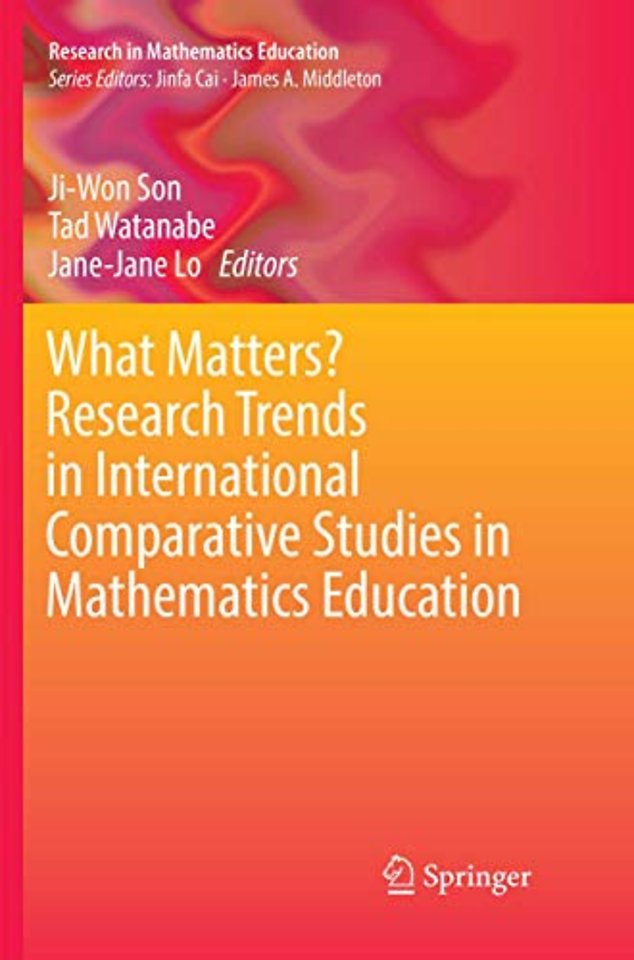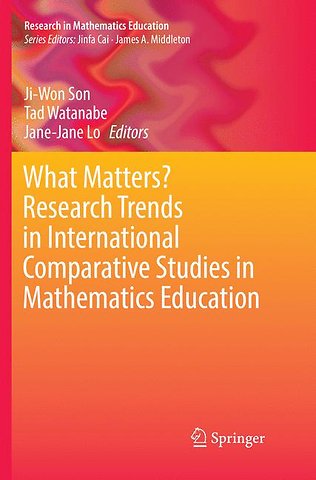What Matters? Research Trends in International Comparative Studies in Mathematics Education
Samenvatting
This book provides a unique international comparative perspective on diverse issues and practices in mathematics education between and among the US and five high-performing TIMSS education systems, Japan, China, Singapore, South Korea, and Taiwan. The book offers multiple perspectives on the important factors that contribute to mathematics teaching and learning in different educational systems and cultural contexts. Using large scale data generated by numerous international comparative studies, the book analyzes and provides context for various methodological perspectives.
The book raises compelling questions and issues for mathematics education researchers, leading to a critical examination of what can be learned from other education systems. Authors address four major research perspectives by critically examining cross-national similarities and differences, such as research on the influence of curriculum on student learning; research on institutional systems of mathematics teacher education; research on improving teacher knowledge and pedagogical approaches; and research using large-scale data. This collection of perspectives serves as a foundation for reviewing and analyzing the international comparative studies introduced in the book.
Specificaties
Inhoudsopgave
<p>1. What can We Learn from Textbook Analysis? Ji-Won Son and Jeri Diletti</p>
<p>2. Intended Treatments of Fractions and Fraction Operations in Mathematics Curriculum from Japan, Korea, and Taiwan Tad Watanabe, Jane-Jane Lo, and Ji-Won Son</p>
<p> 3. Comparing the Difficulty Level of Junior Secondary School Mathematics Textbooks in Five Nations Yiming Cao, Libao Wu, and Lianchun Dong</p>
<p> 4. Uncovering the Label “Asian” in International Comparative Studies of Mathematics Education Yoshinori Shimizu</p>
<p>5. Achievement Gaps in Mathematics and Opportunities to Learn: Insights from PISA 2012 Yan Zhu</p>
<p>Part I Commentary: Toward Understanding the Influence of Curriculum Resources on Students’ Mathematics Learning: Cross-national Perspectives on What Matters Where, When and for Whom Edward A. Silver</p>
<p> </p><p>Part II: Research on Institutional System of Mathematics Teacher Education</p> <p>6. 6. Knowledge Expectations Matter: Mathematics Teacher Preparation Programs in South Korea and the United States Rae Young Kim and Seung Hwan Ham</p>
<p> 7. <pre-service teacher="" training="" for="" secondary="" school="" mathematics="" in="" japan="" and="" korea masataka="" koyama="" hee-chan="" lew</p><p> 8. Predictors of the Teaching Readiness of Future Secondary Mathematics Teachers: A Comparison of Singapore, Taiwan, and the United States Ting-Ying Wang and Feng-Jui Hsieh</p><p>Part II Commentary: Similarities and Differences in Programs for Prospective Secondary Mathematics Teachers Jeremy Kilpatrick</p> <p> </p><p>PART III: Research on Improving Teacher Knowledge and Pedagogical Approaches</p>
<p>9. Cross-cultural Lesson Planning between the United States and South Korea Woong Lim and Ji-Won Son</p>
<p> 10. The Instructional Quality of Mathematics Student Teachers in the United States and Japan: The Possible Impact of the Structure of Student Teaching Douglas Lyman Corey, Keith R. Leatham, and Blake E. Peterson</p><p>11. Reflective Capabilities of Mathematics Education Systems in China, Japan, and the United States Thomas Ricks</p><p>Part III Commentary: Research on Improving Teacher Knowledge and Pedagogical Approaches — From a Comparative to a Collaborative Perspective Sandra Crespo </p>
<p> </p>
<p>Part IV: Cross-national Comparative Studies with Large-Scale Data </p>
<p>12. 12. Self-concept, Self-efficacy and Mathematics Achievement: Students in 65 regions including the US and Asia Ming Ming Chiu</p>
<p> 13. What Do TIMSS Studies Show about Math Achievement Inequality? A Sociological Perspective Seong Won Han, Ji-Won Son, and Chungseo Kang</p>
<p> 14. When Knowing Basic Skills and Procedures is Not Enough Choi, Kyong Mi and Dae S. Hong</p>
<p> 15. The WIFI Study: Students’ Valuing of Mathematics Learning in Hong Kong and Japan Wee Tiong Seah, Takuya Baba, and Zhang Qiaoping</p><p>16. Examining the Association between Teacher Feedback and Mathematics Instruction in Japan, Korea, Singapore, and the United States Seong Won Han, Ji-Won Son, and Chungseo Kang</p><p>Part IV Commentary: Large-Scale International Datasets: What We Can and Cannot Learn from Them, and How We Could Learn More Sarah Theule Lubienski</p>
<p> </p><p>PART V: FINAL COMMENTARY</p><p>17. Reflection on Research Trends in International Comparative Studies in Mathematics Education Gabriele Kaiser and Xinrong Yang</p>
<p> 18. The Missing Link: Incorporating Opportunity To Learn in Educational Research Analyses William H. Schmidt, Leland S. Cogan, and Michelle Solorio</p>

